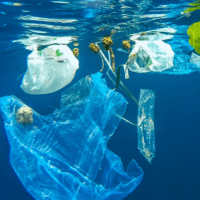October 29, 2021
How climate change is impacting one of the largest whales in the world
Estimated reading time: 0 minutes
Climate change is potentially the largest threat facing our oceans and our planet. Unprecedented levels of greenhouse gases in the atmosphere are warming the planet and disrupting weather patterns, leading to flooding, melting ice, rising seas, droughts and the devastation of ecosystems on land and at sea.
Sometimes, it’s hard to imagine how such a large problem can trickle down into the life of a single species. But in the last decade, warming waters have driven one of the largest whales on the planet, North Atlantic right whales, into new areas in search of food and directly into the path of increased danger.
Until around 2010, North Atlantic right whales would travel with their calves to Canadian waters to feed on copepods, or tiny crustaceans, during the summer months. Their foraging grounds were traditionally the Bay of Fundy and the Gulf of Maine. However, around mid-decade, warmer waters began to drive their food source further north into the Gulf of St. Lawrence, and the right whales followed.
This migration into the Gulf of St. Lawrence led right whales into an area that lacked protection measures designed to keep them safe from the increased risk of entanglements in fishing gear and vessel strikes in the busy shipping area. Since 2017 at least 34 right whales have been killed by vessel strikes or entanglements in fishing gear and an additional 16 right whales were documented with serious injuries from entanglements or vessel strikes—injuries they are likely to die from. In two years alone (2017 and 2019), there were a total of 21 right whale deaths in Canadian waters.
In fact, there have been so many deaths that it has been declared as an Unusual Mortality Event (UME), which is defined as “a stranding that is unexpected; involves a significant die-off of any marine mammal population; and demands immediate response.” Scientists estimate that there are a mere 330 North Atlantic right whales remaining.
So, while climate change can feel like an overwhelmingly large issue impacting our entire planet, it’s important to remember that it also has a significant effect on individual species and the habitats they call home. North Atlantic right whales may be on the brink of extinction, but there is still hope. And we must continue to fight for them.
Canada must continue to create strong, mandatory measures to protect North Atlantic right whales during when they are in Canadian waters, and it’s also time to create a permanent system. We are calling for a permanent, long-term management regime that is transparent and includes a commitment to long-term funding for science, monitoring and enforcement. It’s time to plan for a future where North Atlantic right whales can be protected from vessel strikes and entanglements in fishing gear.
Right whales your help now, before it’s too late.


